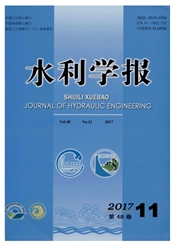

 中文摘要:
中文摘要:
运用水库常规调度和优化调度模型,分别确定水库调度策略,从水电站发电和下游生态需水的可靠性、可恢复性、脆弱性和防洪调度权转移风险出发,建立基于综合利用水库调度模型的调度性能风险评价指标体系。以新安江水库调度为例,对1960--2009年旬径流系列的常规与优化调度结果进行风险评价,结果表明:水库优化调度方法比常规调度方法的发电效益、可靠性、可恢复性更高,但其发电脆弱性和防洪调度权转移风险更高。水库调度性能指标全面地评价了不同调度方法对水库调度结果的影响,该研究为综合利用水库在防洪安全、供水安全、生态与环境安全等方面的决策管理提供了一种新的评价思路。
 英文摘要:
英文摘要:
The conventional operation method and the optimal operation method were applied to determine the operating policies of reservoir. Based on the reliability,resiliency and vulnerability for hydropower, eco-logical water demand and flood control, an assessment index system for performance of reservoir operation has been established. The Xinanjiang reservoir was used as a case study. Observed data of 10-day inflows during the period of 1960--2009 were used in reservoir operation. The reservoir operating policies were assessed. The analysis of results reveals that reliability and resiliency have an increase whereas vulnerability and risk transfer with respect to operation right are likely to decrease as a result of the dynamic programming. The performance indices of reservoir operation can be used to evaluate comprehensively the effect of different operation method on reservoir operating results. This study provides a new evaluation method to secure multi-purpose reservoir in decision making and management.
 同期刊论文项目
同期刊论文项目
 同项目期刊论文
同项目期刊论文
 Utilization of climate information and soil moisture estimates to provide monthly and sub-monthly st
Utilization of climate information and soil moisture estimates to provide monthly and sub-monthly st 期刊信息
期刊信息
